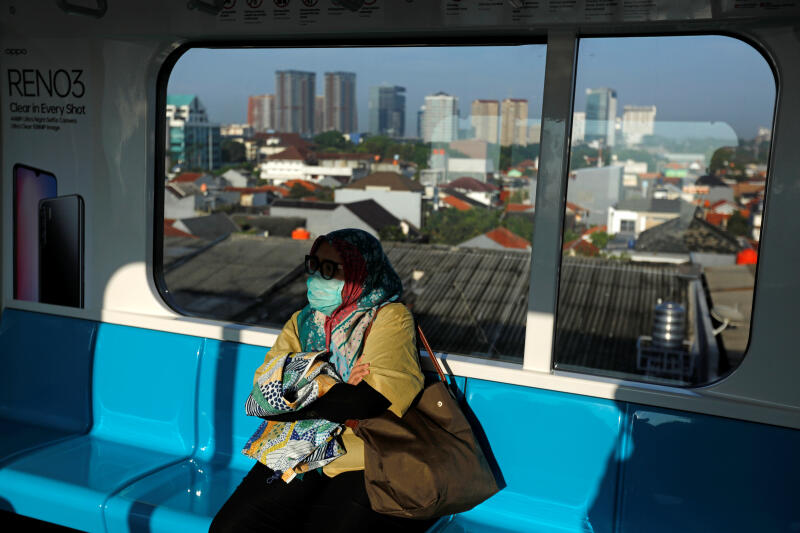Mounting worries that Indonesia could be next hot spot if coronavirus hits lower class
Sign up now: Get insights on Asia's fast-moving developments

A commuter on a Mass Rapid Transit train in Jakarta, Indonesia, on March 17, 2020. Worries, however, are mounting that if Covid-19 hits the poor or densely-populated areas, the contagion would be much harder to contain.
PHOTO: REUTERS
JAKARTA -The coronavirus in Indonesia has so far affected the middle class and up - people who returned from overseas trips, had exposure to infected foreigners, or are in the close circle of those infected.
Worries, however, are mounting that if Covid-19 hits the poor - those living in Jakarta's skid row, for instance - or densely-populated areas, the contagion would be much harder to contain. This fear is putting pressure on the government to begin a massive roll-out of tests.
Jakarta has the majority of coronavirus infections in Indonesia. The world's fourth most populous country has confirmed 172 cases and five deaths due to the virus as of Tuesday (March 17), although observers have surmised that the low figures reflect under-detection and under-reporting. The country of 265 million population has so far only tested 1,138 suspects from 28 of its 34 provinces.
Observers, including urban planning expert Yayat Supriatna of the Trisakti University in Jakarta, have expressed worries about a possible spike in infections once it hits the lower class, who not only shun hospitals but are ignorant about health matters.
Some of Jakarta's heavily populated areas like several spots in South Jakarta's Poncol and Setiabudi have sub-standard living conditions, characterised by poorly ventilated houses that would obviously worsen the condition of anyone with an acute respiratory infection.
"Forty-five per cent of residential areas in Jakarta are slums or densely populated. The poor's ability to prevent (contamination) is minimal, while they cannot afford to see a doctor or go to hospital for a check-up," Mr Yayat said, urging the government to quickly set up public laboratories for free for anyone to get tested for the coronavirus.
While efforts to build such additional public labs in Jakarta are under way, The Straits Times understands that test kits shipped from South Korea and China have arrived in Indonesia.
Meanwhile, Singapore will work closely with the Indonesian government on the Covid-19 situation. President Joko Widodo has said Indonesia is open to accepting aid from Singapore in its fight against coronavirus.
"The people on the streets I have spoken to - even in Jakarta - said they don't know and don't care about coronavirus," public policy analyst Agus Pambagio told ST, stressing that the grassroots were not well-informed about Covid-19 and some believe that over-the-counter medicine can handle it.
As part of social distancing efforts, President Joko Widodo has appealed to companies to allow employees to work from home. The same appeal was given to local governments across Indonesia's 34 provinces. Last week, Jakarta governor Anies Baswedan ordered all schools in the capital to close for 14 days starting on Monday.
The fifth death announced over the weekend does not include some cases that are yet to be confirmed by the authorities.
A March 16 circular by community leaders to the residents of a posh residential complex in South Jakarta's Jagakarsa sub-district appeals to neighbours to stay calm and avoid contact within the next 14 days following the death of a female resident's relatives due to the coronavirus.
The circular also appeals to neighbours to promptly visit a clinic if they experience coughing and a fever over 38 deg C.
Another circular was issued by a school informing parents that a relative of a student whose mother works for the school had died of coronavirus. The deceased was the student's grandmother.
ST understands that fatalities from the virus have surpassed 10 and about 80 per cent of the deceased were Jakarta residents.
- Additional reporting by Linda Yulisman


